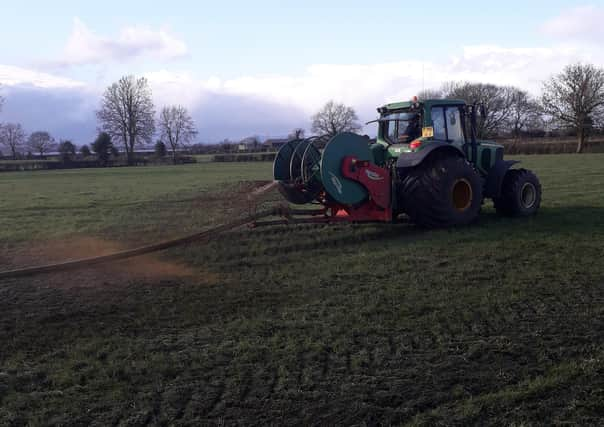Spreading slurry: water quality


This is particularly relevant at this time of year as slurry tankers are back in action after the winter closed period from February 1.
Nitrogen, found in plants and soils, is a critical component of our agricultural system, with plant life being dependent on the nitrogen cycle to provide fresh farm produce from our local farms. However, if not managed correctly, nitrogen applications from farm slurry, in fields with potential areas of high nutrient loss to waterways, can impact on the quality of our watercourses.
Advertisement
Advertisement
Roy Taylor, NI Water Catchment manager said: “In recent years there have been concerning, raised levels of ammonia particularly in the River Derg, leading to shut downs of the local Water Treatment Works. If slurry is spread on poor, very wet ground or during or just before wet weather conditions, it can run off the land; this results in fertiliser ending up in our watercourses. Removing this from our water is difficult and expensive to treat, in order to provide the high quality drinking water we all expect.”
NI Water has this advice for farmers: Do not spread on frozen land, on land with snow or on water-logged ground or when heavy rain is forecast in the next 48 hours. In February, buffer zones for spreading slurry are increased when spreading.
Before spreading slurry, take soil samples which will help decide how much slurry to spread on fields. Farmers can use the DAERA online services CAFRE Crop Nutrient recommendation calendar. To access the calculators log onto www.daera-ni.gov.uk/onlineservices
Low emission slurry spreading equipment must now be used on farms for spreading anaerobic digestate as of February 1 2020 and from February 1 2021 for Slurry contractors.
Advertisement
Advertisement
Drinking water is abstracted from the River Derg at Derg Water Treatment Works, downstream of Spamount, where the nutrient levels from slurry are automatically monitored, 24/7 before the water enters the water treatment process. Derg Water Treatment Works automatically shuts down every time slurry nutrient levels rise above set levels, in order to protect drinking water quality.
This slurry run-off causes NI Water to stop water production, sometimes for up to 14 hours at a time, whenever very prolonged ammonia spikes occur.
A spokesperson said: “NI Water work hard to deal with the problem and can assure customers that tap water quality in the area is unaffected and is of a very high quality standard. However we would appeal to everyone in the area to be vigilant and if you have any concerns about slurry or other pollution activities in the area that could impact the River Derg, please report it to the Northern Ireland Environment Agency’s (NIEA) 24/7 pollution hotline on 0800807060. The cause of these slurry spikes is currently being investigated by NIEA staff in the area.
“In order to minimise the impact of slurry waste run-off into rivers and streams, NI Water encourages farmers to follow best practice and only spread slurry where land and weather conditions allow, always checking weather forecasts before spreading as rainfall could wash valuable nutrients off your land.
Advertisement
Advertisement
Better management of slurry and manure can: Increase business profitability by maximising the value of slurries and manures; Minimise the risk of local watercourses becoming contaminated; Reduce the risk of disease transfer, if you abstract water from a watercourse or borehole as your source of livestock drinking water; Help to reduce the farm carbon footprint by maximising the value of your fertilisers; Contribute to protecting and enhancing local water quality for fish, wildlife and amenity use; Keep on the right side of the regulations and help to protect your farm basic payment.”